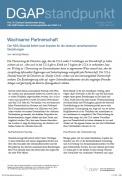Nations have no eternal allies and no perpetual enemies. They have only perpetual interests. Lord Palmerston’s phrase has been re-attributed to so many politicians that it has long since become a figure of speech. At the moment, however, the understanding of intergovernmental friendship between Germany and the US seems to be undergoing a test. Germany’s closest ally collected data relating to the communications of millions of its citizens. Eavesdropping on Chancellor Merkel’s direct conversations with members of her party took place. A line was crossed, and the palpable outrage on both sides of the Atlantic shows it.
Attentive friends…
Being scandalized is not going to help very much, however. Far more important is the need to launch an interest-driven discussion about the nature of intelligence work and the prospects for improving German-American relations. The NSA scandal could very well serve to open Germany’s eyes to the real world.
Germany is important to the Americans, especially because of its weight within the EU and the euro zone but also because it has good relations with Russia and China. This doesn’t mean that agreement between Berlin and Washington is always absolute, however. A good many Americans are irritated by Germany’s restrained approach to security. Reason enough for them to keep an eye on us. America’s perspective is probably more clear-eyed than ours is. At any rate, surveillance of the Germans shows that the US seems to envision friendship in somewhat different terms – and that it puts more emphasis on its own interests and the usefulness of its allies.
Three levels of surveillance
Few are looking closely enough at the different facets of the scandal as a whole. First there is the comprehensive collection and analysis of the communication data of the citizens of US allied countries, the extent of which is now known to us. Then there is the fact that the NSA directly listened in on the confidential conversations of government representatives, including members of the current government. On top of this, German industry suspects that the NSA surveillance was also involved in industrial espionage.
Trawling through data with the help of sophisticated algorithms provided an overview of the contacts and networks of terror suspects. The fact that the temptation to abuse this power has been growing doesn’t change the fact that this practice is a fundamentally understandable and legitimate way of confronting violent criminals with global networks. The offices of allies such as the BND (Bundesnachrichtendienst – the German federal intelligence service) have been participating in this. It may be difficult to completely prevent illegal abuse, but it would be sheer carelessness to give up the entire range of tools because of it.
Tapping government communications and consulates, however, is pure espionage. This cannot be explained by the war on terror, and it surely has political and economic motives. Large-scale industrial espionage conducted on German networks – not only by China but apparently by the US as well – would be equally unacceptable.
But mixing all of these surveillance and espionage complexes makes it too easy for the apologists in Washington to justify any kind of surveillance practice on the grounds of fighting terror.
Controversy in the US as well
In the US there are also arguments surrounding the extent of NSA access, but they are taking place on other fronts. After 9/11 the US gave itself carte blanche to push the envelope on decency and appropriateness in the war on terror. The US has the necessary software at its disposal, lavishes vast sums on the NSA and, to top it off, has the major Internet providers on its own territory. Here, they can access emails – regardless of whether they have the consent of Google and Yahoo or not – and apparently also the content of these communications. Someone, whether it was President George W. Bush himself or the director of the NSA, then decided that spying on US allies was politically feasible and appropriate. The extension of what was considered legitimate and legal, moreover, survived the transfer of the presidency to Barack Obama. Regardless of how much he actually knew about the encroachments, he is now responsible.
Meanwhile, criticism of the procedures employed by the increasingly out-of-hand NSA is growing in the US. In Congress, outrage about spying on allies has been voiced, but mostly representatives and senators are more irritated by the fact that congressional approval was bypassed. Even within the administration, opinions about surveillance practices can be divided. The NSA has cooked up this mess for the American government, and the diplomats and embassies now have to dish it out. In some parts of Washington, German complaints are thus falling on sympathetic ears.
Not everything is on hold
The German government has all reason and every right to demand a noticeable reversal of American policy. US surveillance in the heart of Germany’s government district is a breach of trust and considered as such by politicians and the German public alike. Nonetheless, Germany cannot bring the Americans to reason by means of pressure or sanctions. Neither the cooperation of intelligence agencies nor the impending transatlantic trade and investment partnership (TTIP) can be put up for renegotiation. The TTIP is important to Germany, not only because of the expected increase of German-American trade volume and up to two million new jobs in the OECD area. The agreement can also weld together the West and help it compete with Asian markets.
What we need now are new codes of conduct in the shape of a political agreement in the cooperation of intelligence agencies. Obama has launched an examination of the intelligence agencies that will go until December. He has signaled his willingness to give up spying on allied governments. This is all well and good, but it needs to be laid out in more presentable form. A bilateral agreement comparable to the “Five Eyes” treaty among English-speaking allies is now underway with Germany. This would combine protection against American spying on governments and industry with closer cooperation between intelligence agencies. Of course, this won’t automatically restore broken trust, but it will be an aid for orientation, for future US governments as well.
Even with such a treaty, Germany cannot simply sit back and relax – it will be even more difficult to curb the collecting mania of the agencies. The US government barely succeeds at managing this itself. After all, the temptation to analyze the content of emails and conversations is enormous, especially when they are easy to access. At least the controversy has made clear that the sheer scope of data being gathered is not only staggering but also terrifying for European users, and that Internet providers are becoming accomplices whether they want to or not.
It is therefore necessary to strengthen German counter-intelligence capabilities. Although the BND’s new quarters in Berlin hardly create the impression of underfinancing, counterparts in states to the east and west are better equipped. And until now, German defense clearly looked the other way when it came to the activities of allied nations. In terms of cyber security, German industry also has a lot of catching-up to do, but at least it has now had its wake-up call.
Ultimately, this could be how the NSA scandal helps us resume a careful and interest-driven partnership with the US: by establishing closer cooperation of intelligence agencies and increasing our vigilance about international espionage.

